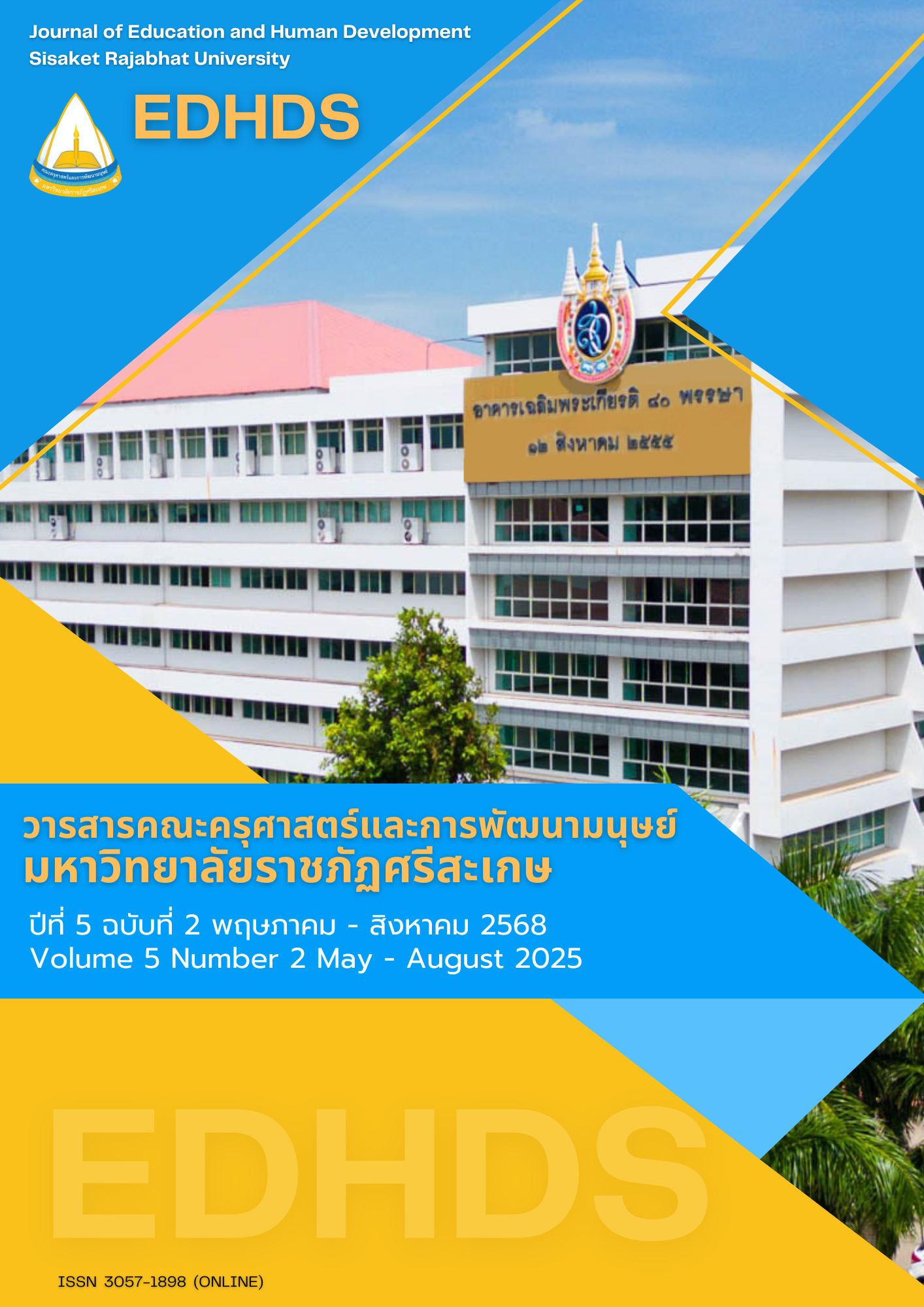Factors Affecting the Decision to Choose an Establishment in the Vocational Experience Training of Students at the College of Social Communication Innovation Srinakharinwirot University
Keywords:
Professional Experience Training, Internship, EstablishmentAbstract
This research aims to 1) study the level of decision making in choosing a workplace for professional experience training and the benefits received from the professional experience training of students of the College of Social Communication Innovation. 2) to compare opinions on decision making in choosing a workplace for professional experience training of students of the College of Social Communication Innovation and the benefits received from the professional experience training, classified by gender, age, branch, cumulative grade point average, and workplace for professional experience training. 3) to study the decision making in choosing a workplace for professional experience training that affects the benefits received from the professional experience training of students of the College of Social Communication Innovation. This is quantitative research with a closed-ended questionnaire as the research instrument. The sample group is 240 students who are practicing their professional experience, calculated from the sample size using the Taro Yamane formula at a level of error of 0.05 from simple random sampling. The data collected from the questionnaires were analyzed using statistics, including percentages, means, standard deviations, and comparisons using t-tests, one-way ANOVAs, and multiple regression analysis.
The research results found that 1) The respondents had opinions on the decision-making level of choosing a business to train their professional experience at a high level overall. The aspect with the highest average value was the organization's reputation. The issue with the highest average value was that students would choose to train their professional experience at a business with good performance and high profitability. In addition, opinions on the benefits received from training their professional experience were at a high level overall. The aspect with the highest average value was that benefits to students were developed and that the issue with the highest average value was that self-development and increased self-confidence were created. 2) Students with different genders have different opinions in deciding to choose a workplace for their overall professional experience training at a significance level of 0.05. Students with different ages, majors, cumulative grade point averages, and workplaces for their professional experience training do not have different opinions in deciding to choose a workplace for their overall professional experience training at a significance level of 0.05. Students with different genders had different opinions on the benefits received from the professional experience training at a significance level of 0.05. Students with different ages, majors, cumulative grade point averages, and workplaces where they trained had no different opinions on the benefits received from the professional experience training at a significance level of 0.05., and 3) The decision to select a business for internship that can predict the benefits received from the internship are as follows: 1) Students will choose to internship in a business with good performance and can generate high level of profit and 2) Students will choose to internship in a business that is close to home or accommodation, 34.30 percent.
References
ณภัทร วุฒธะพันธ์. (2560). ทฤษฎีทุนมนุษย์: ทฤษฎีของการพัฒนาทรัพยากรมนุษย์ นัยสำคัญและอนาคต. วารสารราชภัฏ วิทยาศาสตร์และมนุษยศาสตร์และสังคมศาสตร์, 18(2), 240-253.
ตัสนีมซ์ ศรีรัตน์ และกุลกานต์ เมเวส. (2562). เหตุผลในการเลือกอาชีพช่างตัดผมมืออาชีพของกลุ่มคนเจนเนอเรชั่นวาย กรณีศึกษา: ช่างตัดผมมืออาชีพ อำเภอหาดใหญ่ จังหวัดสงขลา (ปริญญาบริหารธุรกิจบัณฑิต สาขาวิชาบริหารธุรกิจ). มหาวิทยาลัยสงขลานครินทร์.
นันทวัฒน์ ภัทรกรนันท์. (2560. การพัฒนารูปแบบการฝึกประสบการณ์วิชาชีพของนักศึกษาหลักสูตรศึกษาศาสตร บัณฑิต สาขาวิชาการศึกษาตลอดชีวิต คณะศึกษาศาสตร์ มหาวิทยาลัยศิลปากร. Veridian E-Journal, Silpakorn University ฉบับภาษาไทย สาขามนุษยศาสตร์สังคมศาสตร์และศิลปะ, 10(2), 1317-1329.
ปณัสยา พิมพ์กลาง. (2562). ปัจจัยสำคัญที่มีผลต่อการเลือกสถานที่ฝึกประสบการณ์วิชาชีพ. ในการประชุมวิชาการนำเสนอผลงานวิจัยระดับชาติของนักศึกษาด้านมนุษยศาสตร์และสังคมศาสตร์ ครั้งที่ 2 (443-450). กรุงเทพมหานคร:มหาวิทยาลัยราชภัฏสวนสุนันทา.
ปาริชาติ บัวเจริญ, ประภัสสร สมสถาน และนพรัตน์ เตชะพันธ์รัตนกุล. (2565). ปัจจัยที่มีผลต่อการเลือกฝึกงานวิชาชีพใน
สถานประกอบการของนักศึกษาระดับปริญญาตรี คณะวิศวกรรมศาสตร์ มหาวิทยาลัยเทคโนโลยีราชมงคลล้านนา เชียงใหม่. วารสารมหาวิทยาลัยพายัพ, 32(2), 112-127.
ภาวิณี บุญจันดา, ธนาภัสสร์ สนธิรักษ์, ฐิติรัตน์ รักษาศรี, รังสรรค์ หล้าคำจา และ วิมลพร ระเวงวัลย์. (2564). การศึกษา ปัจจัยในการตัดสินใจเลือกสถานประกอบการในการฝึกประสบการณ์วิชาชีพของนักศึกษาสาขาวิชภาษาอังกฤษ คณะมนุษยศาสตร์และสังคมศาสตร์ มหาวิทยาลัยราชภัฏนครสวรรค์. วารสาร มจร มนุษยศาสตร์ปริทรรศน์, 7(2), 95-101.
มนัญญา ธีรกัมปนาทธาดา. (2564). คู่มือปฏิบัติงานหลัก: การฝึกประสบการณ์วิชาชีพนักศึกษา. คณะมนุษยศาสตร์และ สังคมศาสตร์, มหาวิทยาลัยราชภัฏพระนครศรีอยุธยา.
ศิริวรรณ มุนินทรวงศ์. (2561). ปัญหาการฝึกประสบการณ์วิชาชีพและทักษะในการทำงานของนักศึกษาสาขาวิชาภาษาญี่ปุ่น มหาวิทยาลัยธรรมศาสตร์. วารสารเครือข่ายญี่ปุ่นศึกษา ฉบับพิเศษ, 8(3), 206-218.
สุเทวี คงคูณ. (2566). การตัดสินใจในการเลือกสถานประกอบการในการฝึกประสบการณ์วิชาชีพของนักศึกษา มหาวิทยาลัยราชภัฏศรีสะเกษ. วารสารวิชาการมนุษยศาสตร์และสังคมศาสตร์ มหาวิทยาลัยราชภัฏธนบุรี, 6(1), A14-A25.
Downloads
Published
How to Cite
Issue
Section
License
Copyright (c) 2025 Faculty of Education and Human Development, Si Saket Rajabhat University

This work is licensed under a Creative Commons Attribution-NonCommercial-NoDerivatives 4.0 International License.
บทความที่ได้รับการตีพิมพ์เป็นลิขสิทธิ์ของคณะครุศาสตร์และการพัฒนามนุษย์ มหาวิทยาลัยราชภัฏศรีสะเกษ
ข้อความที่ปรากฏในบทความแต่ละเรื่องในวารสารวิชาการเล่มนี้เป็นความคิดเห็นส่วนตัวของผู้เขียนแต่ละท่านไม่เกี่ยวข้องกับมหาวิทยาลัยราชภัฏศรีสะเกษ และคณาจารย์ท่านอื่นๆในมหาวิทยาลัยฯ แต่อย่างใด ความรับผิดชอบองค์ประกอบทั้งหมดของบทความแต่ละเรื่องเป็นของผู้เขียนแต่ละท่าน หากมีความผิดพลาดใดๆ ผู้เขียนแต่ละท่านจะรับผิดชอบบทความของตนเอง



